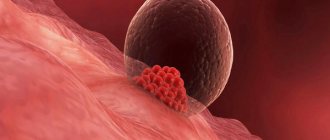The nature of pain with bloating during ovulation
As already mentioned, most often this physical condition occurs after the destruction of the follicle shell and the release of the egg, which the body perceives as microtrauma.
In this case, pain usually occurs on the side where the ovary is located, from which the egg was released in a given cycle. Each cycle the ovaries alternate. The strength of the unpleasant sensations is determined by the woman’s individual pain threshold. But mostly it is a slight nagging pain that disappears after a few days. According to statistics, every fifth woman experiences such symptoms.
Why does your stomach bloat after ovulation?
Most physiological processes in women depend on the state of hormonal levels. The slightest hesitation can affect your well-being or mood.
Hormone levels change throughout the month, periodically causing severe discomfort. Bloating after ovulation worries more than 90% of the fair sex.
Is this normal or pathological, and how to deal with this phenomenon? Let's talk.
What is ovulation?
A woman of childbearing age has a monthly chance of becoming pregnant at the time of ovulation - the release of an egg. If fertilization does not occur during this period, the menstrual cycle ends with prolonged bleeding.
The menstrual cycle is a set of physiological processes in the female body that are necessary for normal conception, gestation and birth of a child. Its duration differs for each woman; it can change under the influence of several factors:
- change of climate zone;
- nervous tension;
- disease;
- endocrine disorders.
Any menstrual cycle can be divided into 2 parts, the boundary of which is ovulation. Usually the egg is released in the middle.
The countdown of a new cycle begins on the first day of bleeding. After its completion, the ovaries begin to work, the next egg prepares for possible fertilization. The regulation of the process is provided by the hormone estrogen and the pituitary gland. After the egg has fully matured, the body is rebuilt, and the hormonal levels change very dramatically.
Ovulation can last up to several days, during which the probability of conception is very high. If the sperm reaches the egg, pregnancy occurs; otherwise, at the end of the cycle, the uterine lining is shed and comes out of the vagina with blood.
Due to changes in hormonal levels, processes occur in the body that a woman easily notices. In some cases, ovulation is asymptomatic, or the girl does not associate these changes with her menstrual cycle.
During ovulation, the following signs appear:
- Increased abdominal volume, bloating and flatulence (they are often associated with the product eaten). This happens under the influence of the hormone progesterone. It prepares the uterus for bearing a child and reduces the tone of the pelvic organs, intestinal motility worsens.
- Changes in vaginal discharge, appearance of cervical fluid. It is very favorable for the life of sperm. The usual secretion of the genital organs is transparent, watery, and the amount is small. Cervical fluid is viscous, white, and has a consistency similar to egg white.
- Under the influence of hormones, sexual desire increases.
- The sense of taste changes, many foods seem bland, and unusual food desires appear.
- The mammary glands increase in size, the nipples become very sensitive.
- Abdominal pain. They usually occur on the side where the ovary is located. The syndrome is associated with rupture of the follicle.
- Increase in temperature (basal). The change is small (a few tenths of a degree), so it does not affect your well-being in any way.
- Lifting the cervix. A woman's body is preparing for conception. The cervix rises a little, becomes softer and opens a little to make it easier for sperm to penetrate it.
- Fluid retention in the cells, a woman's face, arms and legs may swell greatly during this period.
The signs of ovulation are very similar to the symptoms of pregnancy. Having noticed them for the first time, many begin to worry. Doubts can only be dispelled at the end of the cycle. If menstruation does not occur, conception has most likely occurred.
If the cause of bloating is not conception, the woman can really help relieve the condition.
Causes of the phenomenon
Abdominal bloating during ovulation can hardly be called a sign that, to one degree or another, indicates the presence of ovulation itself, and therefore it is definitely not worth determining the period favorable for conception by bloating, as some women advise on thematic forums on the Internet. If the stomach is swollen, this does not mean that the woman has ovulated at all or will happen in the coming days.
Ovulation is a cellular, microscopic process; the size of the germ cell that emerges from the follicle is very small, and therefore it is definitely not worth talking about increased gas formation for this reason. But the entire process of ovulation is invariably and without fail regulated by hormones, which theoretically can also influence the process of accumulation of gases in the intestines.
During the first half of the menstrual cycle, follicles located on the surface of the ovaries mature under the influence of follicle-stimulating hormone (FSH). At first there are several of them, but then one dominant one remains (in rare cases - two), and the development of the others is slowed down and postponed until better times (the woman’s ovarian reserve is not replenished, it is limited).
1-2 days before ovulation, the level of estrogen in a woman’s body rises sharply, which gives a “push” to the rise in the level of luteinizing hormone (known as LH). Under the influence of the LH peak, the follicle membranes become thinner and burst, releasing the egg. This is ovulation. After the release of the egg, the level of progesterone begins to increase sharply, which is produced by the corpus luteum formed at the site of the ruptured follicle.
Now that we better understand the essence of the process, let's talk about the possible causes of bloating.
- Hormonal changes are what make ovulation possible, but any hormones, especially sex hormones, often cause disruption of the digestive tract - the smooth muscles of the intestine relax, flatulence is increased, and the removal of gases, on the contrary, is difficult. Typically, the main cause is a decrease in estrogen that occurs immediately at the time of ovulation.
- The action of progesterone - this hormone, which comes into its own immediately after the release of the oocyte, needs to be said separately. It purposefully relaxes the smooth muscles of the uterus to make it easier for the fertilized egg to attach to the cavity of the reproductive female organ. But the receptors of other organs that have smooth muscles are also sensitive to this hormone. For this reason, during the ovulation period, some women experience gas formation and bloating (the intestines are relaxed), as well as nausea and headaches (due to relaxation of the esophagus and stomach, as well as spasm of cerebral vessels).
- Consequences of the process of follicle rupture - inside the follicle there is a certain amount of fluid, which is a nutrient medium for the maturing oocyte. The follicle also has its own network of blood vessels that feed it. When the membrane of the vesicle ruptures, this fluid and a small part of the blood from the injured small vessels are poured into the abdominal cavity. This causes local irritation and inflammation of the peritoneum, which can also be perceived by a woman as bloating, while intestinal gases as such do not accumulate in the intestines; it turns out that the sensation is very subjective and even false.
- Dietary errors - eating large amounts of cabbage, legumes, yeast baked goods, kvass, grapes, fermented milk products and expired products can be an independent cause of bloating that is not directly related to the day of ovulation. It’s just that the bloating in this case may coincide with the middle of the menstrual cycle, which will be perceived by the woman as a relationship.
Bloating after ovulation as an early sign of pregnancy
This feeling is often considered one of the first signs of pregnancy. The reason for such sensations is a change in the endometrium, which is accompanied by damage to tissues and blood vessels. In this case, the fertilized cell attaches to the walls of the uterus, which causes pulling sensations in the lower abdomen.
The pain is sometimes accompanied by light bloody implantation discharge, nausea, and swelling of the mammary glands. Taken together, these signs indicate that conception has occurred. You can do a test to check whether conception has occurred one and a half to two weeks after the appearance of bloating and other symptoms.
But it must be borne in mind that in the case of pregnancy, bloating can also signal that the fertilized egg has attached in the wrong place and an ectopic pregnancy has occurred. An ultrasound examination performed as soon as possible will help eliminate this possibility.
In what cases does this indicate serious illness?
Bloating during ovulation is easily confused with pathological processes in the pelvic organs and digestive tract. Therefore, a woman should listen carefully to her body and note atypical symptoms that may be alarming.
Pathology can be suspected if bloating is accompanied by the following symptoms:
- bloody vaginal discharge after ovulation, especially heavy;
- severe pain and cramps in the lower abdomen;
- pain localized in the navel area;
- urge to urinate frequently;
- increased body temperature;
- signs of intoxication - headache, nausea, vomiting.
Important! The absence of signs of ovulation and pregnancy with a bloated abdomen indicates the development of a pathological process.
Possible disorders not related to ovulation:
- polycystic ovary syndrome;
- neoplasms of the pelvic and abdominal organs;
- inflammatory diseases of the gastrointestinal tract;
- kidney and bladder diseases;
- food poisoning;
- intestinal obstruction;
- hormonal imbalances, dysfunction of the endocrine system.
Stomach ache after ovulation
Representatives of the fair sex experience cyclical changes throughout their childbearing years. This physiological process is regulated by the endocrine system. Under the influence of sex hormones, the egg matures and is released into the abdominal cavity, and then, through the tubes, it moves to the uterus.
With the help of endocrine glands, the body prepares for conception and further gestation. If the birth of a new life does not occur, menstruation occurs. Bleeding from the genital tract indicates that pregnancy has not occurred and the endometrium is rejected.
The ovulatory cycle is regulated by hormones, the levels of which vary throughout the month. However, the active substances synthesized by the glands affect not only the reproductive system, but also the entire body.
Therefore, many women experience individual changes. Most often, girls are bothered by bloating after ovulation.
This phenomenon is observed in 90% of cases and is often symptomatic.
In most cases, changes in the female body go unnoticed by the woman. And the appearance of flatulence is more often associated with errors in nutrition. However, if you listen to yourself, you can accurately predict the period when a mature egg is released. There are additional signs that accompany the ovulation process:
- Increase in abdominal volume.
- The appearance of copious vaginal discharge, including cervical mucus, which has a thick consistency and a white tint.
- Increased libido.
- Psycho-emotional lability.
- Changes in taste sensations while eating.
- Swelling of the mammary glands and nipples.
- Painful sensations of a short-term nature, mainly from the side of the release of the egg from the ovary.
- Swelling of soft tissues, most often of the face and limbs.
- Changes in basal temperature in the form of an increase in the number of degrees.
Important! Symptoms that occur during ovulation may accompany pregnancy. Therefore, it will be possible to verify successful conception only 2-3 weeks after the first signs appear.
The main cause of flatulence is hormonal changes that occur in the second half of the monthly cycle, under the influence of progesterone.
The hormone affects the tone of smooth muscles and weakens peristalsis.
Therefore, its motor function is disrupted and fermentation is noted under the influence of microflora, which leads to increased gas formation in the intestinal lumen and bloating during and after ovulation.
If discomfort or heaviness appears in the lower abdomen after ovulation, this phenomenon is most often associated with hormonal changes. In this case, the symptoms will be temporary and disappear within a few days.
In some women, the symptoms are more pronounced and cause psychological and physical discomfort. In such situations, you should undergo an examination to exclude pathologies from the reproductive system and gastrointestinal tract.
The doctor will help you choose medications that relieve pain and reduce the manifestations of flatulence. When your stomach ache after ovulation, especially for a long period of time, you need to urgently consult a specialist.
Bloating before ovulation is not typical for physiological fluctuations in hormones that regulate the menstrual cycle. It is advisable to interpret such changes as disorders of the digestive system.
Dynamic observation will determine the presence of an acute or chronic process. If vomiting, nausea, loose stools and fever occur, an intestinal infection should be excluded.
If the symptoms do not worsen, it is necessary to adjust the diet.
Flatulence causes discomfort to a woman, especially if she leads a socially active lifestyle. Therefore, representatives of the fair sex are interested in how to eliminate and alleviate the signs of bloating. To do this, you should first seek help from specialists.
Important! It is necessary to exclude diseases of the gastrointestinal tract and pelvic organs that will require serious drug therapy.
If pathological changes are not identified, you can resort to the following preventive measures:
- menu correction;
- physical exercise.
Diet features
The first step towards reducing flatulence is a proper diet. During the period of expected ovulation, it is better to exclude foods that cause increased gas formation in the intestines. These include the following foods:
- legumes;
- fresh or sauerkraut;
- yeast confectionery products;
- potato;
- smoked meats;
- pickled and salty dishes;
- carbonated drinks;
- tea and coffee in large quantities;
- alcohol.
During the period of ovulation, it is better to consume fermented milk products, fruit and vegetable juices. Meat and fish should be steamed, avoiding spicy seasonings. In order to reduce negative symptoms, you need to additionally include vitamins and mineral complexes.
Preference should be given to herbal decoctions that reduce bloating. The following are well suited for these purposes: chamomile, fennel, thyme, mint. Plant extracts not only reduce unpleasant symptoms, but also have a beneficial effect on the nervous system - soothe, relieve stress and fatigue.
Sports loads
Moderate physical activity eliminates signs of heaviness in the abdomen. A specially selected set of exercises strengthens the muscles of the anterior abdominal wall and helps normalize intestinal motor function.
During the period of ovulation, heavy sports activities should be avoided. Excessive stress can negatively affect the ovulatory cycle. It is necessary to give preference to sports that have a gentle and harmonious effect on the body. Such exercises include the following options:
- swimming;
- yoga;
- slow walking and jogging;
- gymnastics.
However, sometimes it is not possible to cope with the manifestations of bloating using preventive methods. Therefore, in such cases, the doctor may recommend the use of several groups of drugs to reduce gas formation. Such means include the following:
- Defoamers are drugs based on dimethicone and simethicone. The active substance is not addictive, has no systemic effect and acts only on the wall of the gas bubble, destroying it.
- Sorbents - reduce fermentation processes in the intestines and have enveloping properties.
- Herbal preparations - contain extracts of fennel, chamomile, coriander, which have a carminative effect.
Finally
Bloating during ovulation is a physiological condition that can now be successfully corrected. Compliance with preventive measures allows a woman to get rid of unpleasant symptoms and lead an active lifestyle.
Symptoms
The line between symptomatology of the physiological processes of a woman’s reproductive system is very thin. Symptoms of ovulation, pregnancy and pathological processes of the reproductive system are often similar , which makes diagnosis difficult.
Symptoms of a bloated belly during ovulation may include:
- feeling of fullness in the stomach;
- intestinal colic;
- visual increase in waist by a couple of centimeters;
- sounds of gurgling in the stomach;
- constipation or diarrhea;
- excessive release of gases;
- belching or heartburn.
To understand that these are not diseases of the intestines and other digestive organs, additional symptoms that accompany ovulation will help:
- change in the nature of vaginal discharge - its quantity and viscosity increases;
- increased libido;
- slight enlargement and tenderness of the mammary glands;
- pain in the lower abdomen in the projection of the ovaries;
- swelling of the face and limbs.
With the release of the egg from the follicle, the listed symptoms should gradually fade away and the condition should return to normal.
Important! It is possible to find out exactly what process caused the bloating only at the end of the menstrual cycle.
What to do about bloating after ovulation
If the test turns out to be negative, and discomfort continues to appear regularly, it is better to visit a doctor to make sure that this condition is not a harbinger of problems in the body.
To avoid unpleasant phenomena such as constipation and gas during ovulation, it is better to follow a small diet during this period:
- exclude beans, cabbage, smoked foods;
- reduce salt intake;
- give up provocative drinks: soda, coffee, alcohol;
- take B vitamins, microelements - magnesium, potassium.
In addition, when a woman feels this way, she should not lie down, but rather be mobile in order to avoid constipation and activate her abdominal muscles. By the way, by eliminating digestive problems during the period of ovulation, you can come to the point that such harbingers of critical days as irritability and nervousness will disappear.
Help
What can you do if flatulence occurs? If pregnancy is not confirmed, but pain and bloating are present, swelling of the soft tissues in the lower abdomen additionally appears - this is a signal that you need to see a doctor and get advice.
The diet should be reconsidered. Sometimes poor nutrition does more harm than any disease. A change in the menu, following a diet, and gentle dietary food will allow the gastrointestinal tract to recover and function normally again. Foods that cause increased gas formation should be excluded. Remove sour, fatty, spicy, smoked, alcohol, smoking. Carbonated drinks are among the provocateurs of flatulence.
If you drink chamomile infusion instead of soda, intestinal motility will significantly improve. The product will help remove toxins from the body, having a diuretic effect.
Vitamin B, magnesium, potassium are only welcomed by the body. Deficiency mania has an extremely negative impact on the condition of the intestines. At this moment, salts and water are retained in the body. The stomach is swollen and hurts. A significant deficiency of magnesium in the blood creates stress. It is possible to replenish magnesium reserves with dark chocolate (at least 70% cocoa beans) or by taking a mineral complex with a high magnesium content.
The pain syndrome that occurs during ovulation is provoked by estrogen and prostaglandin. It is enough to exclude alcoholic drinks, caffeine, milk from the menu, hold out for 1 month and monitor your well-being. Taking Omega-3 will reduce the amount of prostaglandin in the body and significantly reduce pain.
What not to eat during periods of pain and bloating:
- Any food products related to legumes. This food is considered heavy, takes a long time to digest and remains in the digestive tract.
- Give up sweets and starchy foods for a while.
- Avoid pickled foods, pickles, and smoked foods on the menu.
- Soda provokes an increase in the amount of gases in the intestines, which further provokes flatulence.
- Potato dishes, fresh cabbage.
- Yeast bread and any product created using yeast.
Try to consume fermented milk, low-fat foods. During any period of the menstrual cycle, physical activity is necessary. You will need to monitor the moderation of loads and avoid severe fatigue.
During this period, it is recommended to engage in calm sports: yoga, stretching. You can swim in the pool, this puts stress on all parts of the body, while relaxing it at the same time. It is advisable to postpone cardio training to a more suitable period. As maintenance medications, it is recommended to take multivitamin complexes with an increased content of B vitamins.
If you follow the recommendation, you can avoid the occurrence of unpleasant sensations or significantly reduce the intensity of the symptoms. Sharp, nagging pains are removed. It is possible that the pain syndrome indicates emerging pathologies of the internal organs of the pelvis.
It is advisable to visit a gynecologist for consultation and diagnostics. After receiving the results, if necessary, treatment is prescribed.









